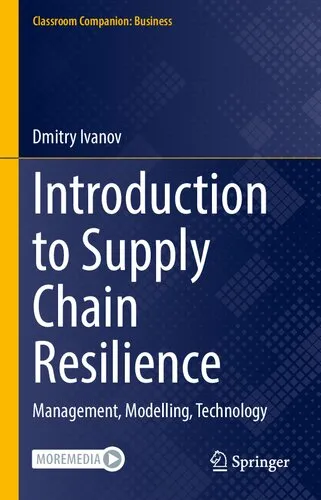Introduction to Supply Chain Resilience: Management, Modelling, Technology (Classroom Companion: Business)
5.0
Reviews from our users

You Can Ask your questions from this book's AI after Login
Each download or ask from book AI costs 2 points. To earn more free points, please visit the Points Guide Page and complete some valuable actions.Introduction to Supply Chain Resilience: Management, Modelling, Technology
In today’s dynamic and ever-evolving world, supply chain resilience has become a cornerstone for business sustainability and competitive advantage. "Introduction to Supply Chain Resilience: Management, Modelling, Technology" is a comprehensive guide designed for students, business professionals, and academics who aim to deep dive into the mechanisms that make supply chains robust and adaptive in the face of unprecedented disruptions. This book is part of the "Classroom Companion: Business" series and serves as a critical resource for understanding how to navigate uncertainties in the modern supply chain landscape.
The journey of supply chains is fraught with risks emanating from global transformations, economic shifts, and technological advancements. This book provides a structured and insightful approach to understanding resilience, empowering readers to better prepare for, adapt to, and recover from disruptions. By blending theoretical foundations, practical case studies, and advanced modelling techniques, it ensures that readers can apply these concepts across industries and geographies.
Detailed Summary of the Book
"Introduction to Supply Chain Resilience: Management, Modelling, Technology" offers a multi-dimensional approach to the concept of resilience, underpinned by management strategies, mathematical modelling, and emerging technologies. This book is structured to provide a balanced perspective between theory and application, making it suitable for academic and practical contexts.
The book begins with foundational knowledge, answering the "what" and "why" of supply chain resilience. From there, it transitions into discussing critical management strategies for fostering resilience, such as risk mitigation, flexibility, agility, and redundancy. It also examines real-world disruptions, including natural disasters, political instability, pandemics, and cyber threats, to underline the urgency of building resilient supply chains.
Next, the book delves into advanced modelling approaches like digital twins, scenario analysis, and optimization techniques, which enable organizations to predict potential disruptions and simulate outcomes. Coupled with discussions on emerging technologies like blockchain, artificial intelligence, and IoT, readers are introduced to tools that enhance both visibility and responsiveness.
The book concludes by providing actionable frameworks that readers can implement within their organizations. With detailed case studies and examples, it connects theory to practice, ensuring readers can immediately apply what they learn.
Key Takeaways
- Comprehensive understanding of supply chain resilience and its significance in the modern business environment.
- An in-depth exploration of key factors impacting supply chain risks, including globalization, digitization, and environmental changes.
- Practical management strategies for improving supply chain performance during crises.
- Introduction to advanced modelling techniques like digital twins, simulation, and optimization for supply chain analysis.
- Insights into the role of emerging technologies such as AI, IoT, and blockchain in improving supply chain resilience.
Famous Quotes from the Book
"Resilience in supply chains is no longer an option; it is a fundamental necessity for businesses striving to thrive in a volatile, uncertain, complex, and ambiguous world."
"Every disruption holds a lesson—those who learn and adapt emerge stronger."
"Technology is the enabler, but human ingenuity remains the cornerstone of building resilient supply chains."
Why This Book Matters
Amidst today’s ever-growing uncertainty, businesses confront significant risks within their supply chain networks. Global events such as the COVID-19 pandemic, geopolitical tensions, trade wars, and climate change have underscored the vulnerabilities in even the most sophisticated supply chain systems. This book provides a much-needed framework and guidance to help businesses address these challenges effectively and proactively.
What sets this book apart is its strong focus on bridging the gap between theoretical perspectives on supply chain resilience and their practical applications in real business environments. It equips readers with the knowledge needed to not only identify potential risks but also to craft strategies for adapting to these challenges while ensuring business continuity. By integrating management principles with cutting-edge tools and techniques, the book offers a 360-degree view of how resilience can be built systematically.
Whether you are a seasoned supply chain professional aiming to refine your expertise, a student studying logistics or operations management, or a researcher exploring the intersection of technology and resilience, this book delivers invaluable insights. It does not merely explain concepts—it empowers readers to make tangible changes within their organizations.
In the end, "Introduction to Supply Chain Resilience: Management, Modelling, Technology" prepares its readers for the future. It is a timely and relevant addition to the growing body of knowledge on supply chain management and an essential resource in uncertain times.
Free Direct Download
Get Free Access to Download this and other Thousands of Books (Join Now)
For read this book you need PDF Reader Software like Foxit Reader


